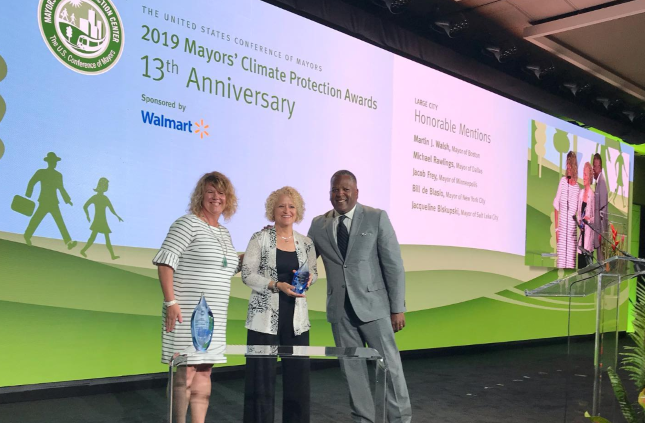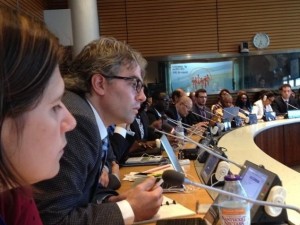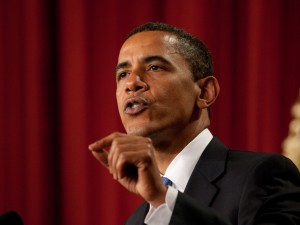
Salt Lake City Mayor Jackie Biskupski (center) was a sponsor of the resolution.
U.S. Conference of Mayors urges federal government to put a price on carbon
By Claire Squire
Carbon pricing has been receiving major press lately—tens of millions heard it discussed in the first two presidential debates—and now, America’s mayors are joining in on the action. The U.S. Conference of Mayors, an organization comprising 1,407 mayors from cities with populations of 300,000 or more, recently passed a series of environmental resolutions at their annual meeting, one of which calls for Congress to put a price on carbon.
The resolution cites climate change’s “challenges to human health and safety, quality of life, and the rate of economic growth” and “strongly urges the United States Congress to pass legislation that imposes a price on carbon emissions sufficient enough to reduce carbon emissions in line with ambitions detailed in the Paris Agreement.” While the resolution did not specify what type of carbon pricing proposal the organization prefers, it was passed by hundreds of mayors with bipartisan support.
Media coverage
The recent endorsement not only demonstrates local support for carbon pricing, but has also made national and local news. News outlets including the Washington Examiner, InsideClimateNews, and Bloomberg Environment all published stories about the resolution, and many mentioned CCL’s ongoing efforts to pass the Energy Innovation Act. In the Washington Examiner, CCL’s Senior Director of Government Affairs Andres Jimenez was quoted stating, “Not only is carbon pricing an effective, efficient way to reduce emissions, but it’s also becoming the consensus solution, as this vote shows.”

CCL’s role
Both staff members and volunteers played crucial roles in passing the resolution. Andres Jimenez, CCL’s Senior Director of Government Affairs, spearheaded the initiative and drafted the resolution, and notes that this latest endorsement for carbon pricing “would not have happened without CCL.”
He decided to approach the organization because, he says, “Mayors are on the front lines of climate change. They’re dealing with the on-the-ground impacts every day, and they know people in their cities want action.” Once the resolution was introduced and coming up for a vote, it was time to get CCL volunteers involved. CCL “reached out to the group leaders in every city with a mayor attending the conference, asking them to contact their mayor,” Legislative Assistant Adeline DeYoung explains. “Our chapters did an amazing job getting in touch with their mayors with less than a two week notice, giving the resolution the push it needed.”
Implications of resolution
Paul Helmke is a former mayor of Fort Wayne, Indiana, who served as the president for the U.S. Conference of Mayors from 1997-1998. He’s a big believer in the power of local leadership, and he thinks this endorsement carries serious weight. “To have them on record saying that this is an important issue and they hope the federal government will do something…can have a lot of influence,” Helmke states. “One thing I like to point out to people is that the U.S. Conference of Mayors got their start in the early 30s, during the depths of the depression. The federal government was not doing much to alleviate poverty in the country, and mayors did not have the luxury of doing nothing, as the people that had lost their jobs and were going hungry were in the city.”

Paul Helmke
Sound familiar? Today, cities are struggling with climate impacts, and while there is movement at the federal level, mayors feel pressure to act now. The organization was ultimately formed when a group of 17 mayors went to the federal government to demand action, where they began working with the president and members of Congress to pass the legislation they felt essential. “Mayors always take these [resolutions] seriously, and we hope that the federal government will take them seriously too, Helmke says.”
The resolution is proof that carbon pricing is supported locally, making it a powerful tool for volunteers to use when speaking with members of Congress. Danny Richter, CCL’s Vice President of Government Affairs, says, “To the extent that all politics is local, which is a large extent, you really can’t find a more local politician than the mayor of your town or city.” In addition to this recent show of mayoral support, many municipalities have passed resolutions supporting carbon pricing. Richter adds that it is important to note, “Republican mayors voted for this resolution as well,” which provides additional evidence of the breadth of support for carbon pricing in the United States.
Claire Squire is an intern with CCL’s Communications team and a second-year Environmental Management student at Indiana University.



